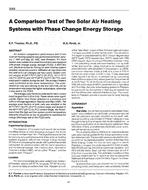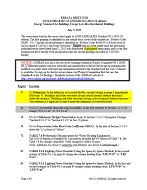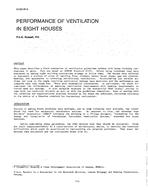Companion studies by Antman (1), Riley (2) and Wolfbrandt (3) have considered the onset of self excited oscillations in gas furnaces. Antman indicates the need for understanding the response characteristics of the flame whereas Riley and Wolfbrandt describe and exhibit a means to measure the transfer function of the flame itself.
Essentially, the flame acts as an amplifier of volume disturbances in the inlet (cold) air and gas flow. These disturbances, if locked in by the resonant characteristics of the combustion chamber, lead to a relatively loud pure tone sound. Antman et al. (4) show, in their preliminary analysis, that the insertion length of the bqrner in an (idealized) cylindrical combustion chamber is an important parameter. The amplification of the disturbances is primarily attributed to the flame acting as a thermal source. A simple model of the flame and combustion chamber is that of a “hot spot” partially inserted in a vertical tube. The initial temperature field causes a vertical pumping of outside air through buoyancy forces. The entrained air flow will, at certain velocities (dependent on the temperature gradient, tube diameter and length), exhibit disturbances which when thermally amplified may lead to resonance.
The proposed configuration is a classic one, referred to as a Rijke tube (5). In his early work, Rijke suggested that the oscillations are strongest when the heat source is located one fourth the length of the tube from the bottom. He explained the oscillations by saying that the rising convection current was expanded in the region of the heat source and then was cooled downstream by the tube walls. The sound was caused by successive expansions and contractions. This explanation ~as later proved to be inadequate.
Product Details
- Published:
- 1978
- Number of Pages:
- 6
- File Size:
- 1 file , 350 KB
- Product Code(s):
- D-AL-2502
- Note:
- This product is unavailable in Russia, Belarus


